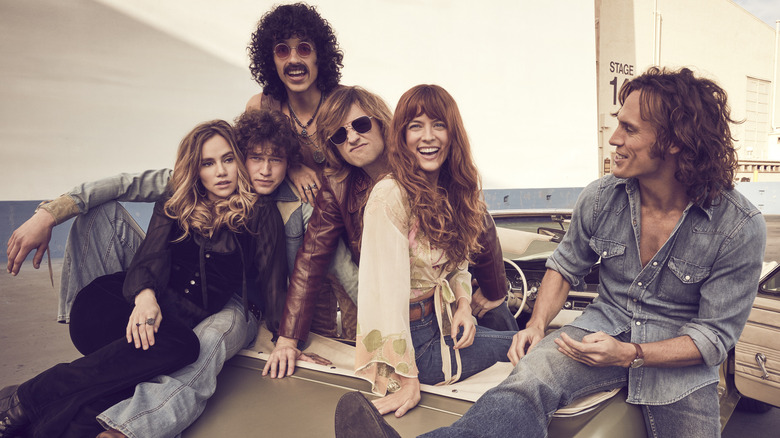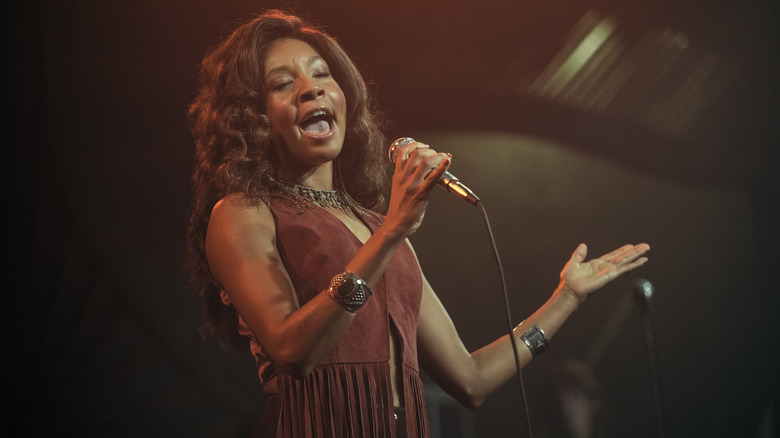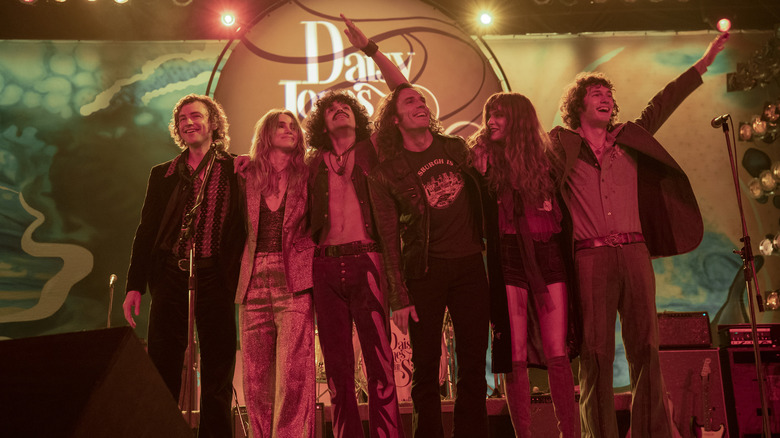Daisy Jones & The Six Review: An Electrifying Musical Act That Burns Bright, Then Fizzles Out
Packaged as a rock n' roll rollercoaster, "Daisy Jones & The Six" is hiding a not-so-secret soft side. Once you set aside the hardcore drugs, the brimming tensions, and the inner turmoil, the Prime Video series is really about the essence of creativity. Made collaborative, making music (and any other kind of art) is a uniquely intimate experience: one with the power to make or break a band on the cusp of greatness. An adaptation of Taylor Jenkins Reid's bestselling novel, "Daisy Jones & The Six" doesn't just chronicle the rise of the titular musical act — it recounts their legendary fall. The fictional rock band fronted by Daisy Jones (Riley Keough) and Billy Dunne (Sam Claflin) is world renowned because they burned bright and brief, then abruptly imploded. The series picks up 20 years after their surprise final performance, in the form of a tell-all documentary, to finally reveal what went wrong,
The first two episodes start us slow and steady, charting the collision course of a scrappy Philidelphia cover band, and a brittle young songstress, who's even greener than them. But once their paths cross and the first joint track is recorded, Daisy Jones and The Six are a global phenomenon in the making.
For Billy, this rock and roll tale begins where others too often end: failing to fend off his personal demons, the frontman of The Six turns to alcohol and drugs, quickly succumbing to the loneliness of life on the road. But that rock bottom comes before success and fame. In Billy, we get a twist on a familiar archetype: with his hard-partying days in the past, how does Billy now fit into the world of rock n' roll?
Daisy Jones (Riley Keough) is somewhat familiar too: ethereal and oozing natural charisma, she knows how to stop a room in its tracks. So as she wanders the LA music scene, eyes following her every move, it quickly becomes apparent that this free-spirited woman could make the perfect muse. But that isn't the story. Daisy was made for the spotlight; she has the magnetic, immeasurable, indefinable quality that allows her to move people — with words and performance both. And Billy has it too. So obviously, bringing them together will make magic, right? That's certainly the belief of music producer Teddy Price (Tom Wright) and to his credit, when the duo finally come together, share a mic and harmonize away on a duet, everything does click into place. But when the music cuts out and the collaboration has to work beyond the magic of sharing a mic, it's not hard to see why this band will one day fall apart.
Riley Keough steals the show
The Six is rounded out by Karen Sirko (Suki Waterhouse) on keys, who argues her freedom above all else; guitarist Graham Dunne (Will Harrison), who spends the season nursing a schoolboy crush; bassist Eddie Roundtree (Josh Whitehouse) who yearns for more than the band gives him; and drummer Warren Rojas (Sebastian Chacon) who's often high and wholly unproblematic. Their secret sixth member is Camila Dunne (Camila Morrone), Billy's longtime girlfriend who champions their success every step of the way.
By its third episode, "Daisy Jones & The Six" hits an undeniable groove by bringing all the pieces together. When at last the brand forms, we get to revel in the drama of all the grating and grinding; between the seven of them, there are a million ways to wear each other out with rough edges and sharp tongues. The friction is most clear between Daisy and Billy, but don't let the rest of the band fool you; just because they aren't as vocal, doesn't mean nothing is brewing.
Though this is certainly the kind of show that makes great use of an ensemble, among the talented core cast are some gleaming standouts. Riley Keough is the brightest star of them all, a fitting role for the titular Daisy Jones. She is magnetic on stage and mesmerizing in the role — one that doesn't leave a lot of room for anything but perfection. The difficulty of being Daisy Jones (much like playing the lead in a musical biopic) is convincing the audience that the merits are earned. Millions of fictional people are in love with Daisy, and we have to be convinced that it's deserved. Keough more than rises to the challenge. It's no secret that she wasn't a practiced singer before landing the role, but this isn't about being blown away by her vocals: it's about believing that she could command a stage, which she nails every single time.
Morrone is the other highlight of the series: while Camila could've easily become a passive passenger in this tale — the simmering jealous wife, a mere obstacle to the show's compelling duo — Morrone's performance makes sure that's never the case. Deftly balancing her conviction and vulnerability, Camila is the beating heart of the series.
Trying to rise above the source material
Writing an album, sharing the stage, and making music together — night after night — is deeply intimate. For Billy and Daisy, it means starting to know each other in a way that no one ever will. Despite all the ways they're different, the two musicians share more in common than they can articulate. And that brings them together as much as it tears them apart. It's fascinating to watch, and painful all the same — especially with Camila always on the edge of getting hurt.
Diehard fans of the book will need to have an open mind going into the series, because the changes are abundant (and occasionally maddening). The Billy-Camila-Daisy love triangle feels further thrust into the spotlight, at the expense of nuances that elevated the novel's story and are sorely missing from this adaptation. But the book also had its rough edges, and the series often smoothes them over for the better. Most notable is the expanded role of a once peripheral character, Simone Jackson (Nabiyah Be), a musician also reconciling her professional dreams with personal conflict.
By virtue of this being the story of a single band, there isn't much room for the rest of the world — Simone included — but as Daisy's best friend, she gets occasionally woven in. Be makes the most of that time, delivering a beautifully drawn-out character whose corner I was in from the very beginning. Simone widens the world beautifully, showing us a different side of the 70s music scene, and another angle of trying to realize dreams in a soul-crushing industry. But her story is always an extension of Daisy's, a shortcoming of the book that the series never completely escapes.
Come for the vibes, stay for the turmoil
Much of the music in this series sounds more modern than likely intended. The band's album is more of an homage to Fleetwood Mac rather than something that may have been written in the same period. But that's by no means a dealbreaker. The 25 original songs penned exclusively for the series are still quite a feat; the shiniest among them being the oft-repeated, "Look At Us Now (Honeycomb)," which shoulders so much emotional weight that it strikes a new chord every time it's used.
James Ponsoldt (of "The Spectacular Now") is in the director's chair for the first five episodes, establishing the tone, visual flair, and very prominent 70s glaze. Taylor Jenkins Reid wrote a novel that evoked Fleetwood Mac even without visuals, and the adaptation isn't interested in hiding that allusion; from the costumes to the conflict to the music itself, the influence of the iconic band is everywhere. In that regard, the series wonderfully captures the essence of the book — though it does trade away the oral history framing device for the sake of living directly in the story itself.
While the series does use the format of a fictional documentary, that's not how the story itself is told. There are only occasional interjections — for hubris, for a punchline, for a perfectly chosen facial expression here and there. Sometimes, those moments hit hard — but in clunkier, less motivated moments, it's hard to remember why they bothered to stick with the framing device at all. It does play a major role in the ending, but that happens to be an aspect of this story that falls painfully flat.
At its best, "Daisy Jones & The Six" is about the chaos of the creative process, the toil of recovery, and the messiness of rock n' roll. It's about everyone's imperfections and the enormous effort it takes to make a phenomenon like Daisy Jones & The Six happen and last, for even as short a burst as they do. But in one fail swoop, the ending undercuts all of that, leaning too far into melodrama and cheapening so much of what came before.
Unfortunate as that end note may be, there's something ironic about "Daisy Jones & The Six" fumbling the ending of a story about a band that abruptly fell apart. Much like the titular musical act, the series is distinct in its imperfections but otherwise, absolutely electrifying. The cracks are undeniable, but when we're in the moment, soaring with the highest highs, the flaws are easy to forget.
"Daisy Jones and the Six" premieres March 3 on Prime Video with its first three episodes. The rest of the season will arrive in muti-episode chunks, weekly on Fridays.



